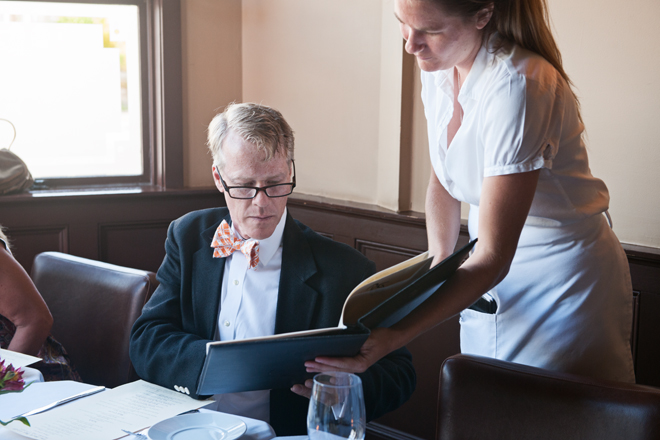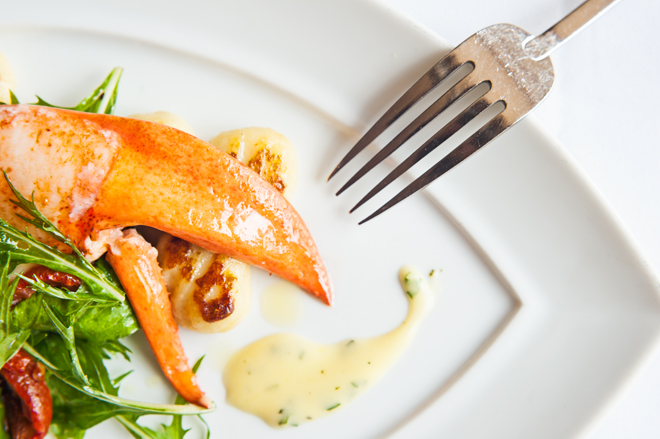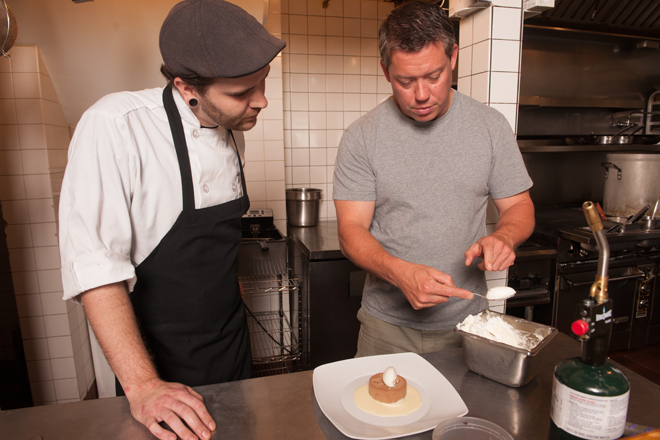Back Bay Grill
“Cold food on cold plates, and hot food on hot plates.”
This is the humble philosophy that chef Larry Matthews has held onto throughout his long journey to becoming one of the most successful and universally well regarded restaurateurs in Maine. Matthews explains that it’s about maintaining a strong grip on the basics and building from there. “It doesn’t matter how many great things you put on a salad if the bottom greens are wilted from a plate that’s too hot.” He continues, “So many people get hung up on being extremely ambitious and they forget about the simple facts.”
This underlying simplicity is also part of what makes each and every meal I have the privilege of enjoying at Back Bay Grill a memorable one. Dining here is a throwback of sorts, to a time when going out to eat was meant to be luxurious and unhurried, when the primary goal of the restaurant was to meet a guest’s needs, unfettered by egos and reputations. All of the little elements are seen to, right down to the BBG logo stamped on each individual ramekin of sweet, creamy butter. The seating is built for comfort, and the most decadent foods, such as foie gras and morel mushrooms, are treated with respect and allowed to shine on their own.
Preparations that I am overly familiar with, such as butter-poached Maine lobster, manage to somehow be far tenderer than any I have ever experienced. A dish of handmade fettuccine with sweet corn employs a technique of extracting the milk from the kernels and simmering it until it’s so thick you could stand a spoon in it. Every dish that comes out is cause for anticipation. Wine pairings are always spot on, and if there is any doubt, the waiter will often pour two separate glasses and let the guest decide which works best. All of this is the culmination of what Matthews had set out to achieve long ago.
His education began in the early 90s, when Matthews, a Kennebunk native who was attending culinary school in Boston, accepted a position as a cook at the White Barn Inn. He recalls not really having any idea what the position was about, and assuming that his two years experience cooking at lobster pounds in high school would be more than sufficient for the task at hand.
Upon arrival he began working under chef Gethin Thomas, a man who to this day remains the most influential mentor of Matthews’s career. “Before I started cooking at the White Barn, I thought that all mushrooms were white and round,” he recalls. “The astonishing array of different types blew my mind.” This was where the idea of simplicity began to take root for Matthews. “When someone comes in to prep at 2 a.m. every night and makes beautiful handmade pasta, you’d better not ruin it by dropping it into water that has not yet come to a full boil,” he says.
Right before a service began, Thomas would sample the large batch of mashed potatoes that had been prepped for the evening, and if he deemed the seasoning or texture to be off, he would demand that they be thrown away and redone.
“When you’re working for someone you want them to be happy when they’re looking over your shoulder,” Matthews explains, “Which makes it weird when you get to the top and now you’re the one looking over cooks’ shoulders. In spirit, Gethin is still always looking over mine.”
After splitting his time between the White Barn and his classes while he finished school, Matthews managed to use his connections to acquire a coveted position at the Inn at Little Washington in Virginia, under legendary chef Patrick O’Connell. He was inspired once again by how simple and perfect the food was, and how he had no idea that blanched zucchini, for example, could taste so good, and that when the ingredients are of the highest caliber the preparation does not need to be overcomplicated. He tells a story about O’Connell: a guest of the inn requested a chessboardand there was none on hand. A server offered to pick one up on his way back from the city later on, but O’Connell objected: if they were going to have a chessboard at the Inn at Little Washington it would need to be beautiful, hand-carved, and up to the standards of everything else.
“The best or nothing at all, and he stayed true to that,” Matthews says. “And I’m not saying we’re the Inn at Little Washington, but it’s a theory that we still try to hold true at Back Bay Grill every day.”
After a year at the inn, Matthews returned home to Kennebunk. After a few short-term gigs, he landed a job at the Back Bay Grill in 1996, when it was owned by Joel Freund. He started on sauté but quickly transitioned into a role as sous chef. After leaving very briefly he returned to accept the position as head chef at a mere 24 years old, and so began a fruitful and happy working relationship with Freund.
The next few years were very good for Matthews, who formed a very close bond with Freund while developing both his menus and technique. In 2000, he was invited to cook at the James Beard House, and he recalls the thrill of seeing his picture on the front of the members’ newsletter about his upcoming dinner. Things were finally starting to happen for him. He enthusiastically went to Freund to show him the picture, and in response, Freund asked him to step outside for a moment.
“He told me that he had been diagnosed with kidney cancer and that he wanted me to buy the restaurant from him,” Matthews says, “I went from such a crazy high to a crazy low almost instantly. This was so much to process, and I remember just standing out on the street, crying like a baby.”
They pressed on and put the deal together, which went through on August 16, 2002. Freund passed away in 2005, and Matthews has continued to build on and improve what they started so long ago.
Over the years Matthews has had many notable Portland chefs, such as Jason Williams, now of the Well at Jordan’s Farm, and Erik Desjarlais, who ran notable French eateries in Portland for years, do stints in his kitchen on their way to opening restaurants of their own. Any that you speak to will always hold their experience with Matthews in the highest regard. “Larry brings out the best in cooks,” Desjarlais tells me. “He’s a brilliant guy and a chef’s chef.”
After over a decade of working almost every waking minute in his kitchen, Matthews has begun the process of allowing his sous chef, Graham Botto, to slowly take over a few nights a week on the line.
“It’s something that I maybe wish I could have allowed myself to do a few years ago, but then again it just feels right with Graham.” He adds that, “I still get my hands dirty every day; it’s just not as much of a grind as it has been.”
Although the menu at Back Bay Grill changes with the seasons and times, there are always certain staples available, such as seared foie gras, which Matthews procures from Hudson Valley. On a recent visit he is served it with pistachio bread pudding, macerated raspberries, and honey, playing on the classic sweet, salty, and insanely decadent characteristics that a good plate of seared foie should have.
“It’s basic, but guests like it and it sells. I don’t get caught up in my ego, and I don’t worry about what styles of preparations may be perceived to be ‘played-out.’ My menu is customer-driven.”
Another standby is salmon cured with nothing more than a paste of salt, pepper, sugar, and dill. Matthews takes the whole side of the fish and cuts one long strip down the backside rather than cutting several strips across. This allows for both a nicer presentation and a more consistent cure time, which is 48 hours, practically to the minute.
The result is a clean-tasting gravlax that is quite versatile, especially alongside spoonbill caviar and crème fraiche, with gremolata and olive focaccia. Matthews describes this as a perfect example of how he and Botto collaborate: “It’s my salmon preparation, but it’s his dish.”
What Matthews really enjoys is butchery. He tells me that the prospect of breaking down a whole lamb always gets him excited to drive to work. At this point he compares it to breaking down a chicken. He is so accustomed to the work that he sometimes forgets that he is doing it, except that he sets personal goals with regard to speed and efficiency.
“I’m really specific about wanting the finished product to look as clean as possible. I use a hacksaw and a small knife, which I almost imagine as a sharp little finger, delicately working its away around the joints and sinew.”
I have the privilege of enjoying the fruits of his labor. I’m presented with the outside round of a leg of lamb, which is as tender as the loin. It is served with a German-style potato salad, warm fava beans, crispy beer battered onion rings, and perfectly cooked lamb sausage made from the scraps of the animal. No part goes to waste.
While Matthews has set the tone in the kitchen, Adrian Stratton oversees what is widely regarded as one of the most cohesive service experiences in the city. This is largely due to the level of communication among the staff, and attention to even the smallest detail. If you don’t want ice in your water, everyone on the floor will know, so your needs will be met regardless of who is at your table.
Stratton, a native of Springfield, Massachusetts who got his first job washing dishes at 14, is the consummate host. He maintains that the most important part of the dining experience is the comfort of the guest, whether she dines out once a year or three times a week. He emphasizes the need to establish a rapport with these guests, in an effort to establish an all-important level of trust. Of course, having the right staff is imperative in this endeavor.
“When it comes to training, everybody has a different base of experience. For four or five days we learn about each other,” explains Stratton. “I can teach someone who has never waited tables to do fine dining service, but it’s really based on having a positive attitude and taking pride in what you do.” For Stratton, once he establishes that a candidate has the drive, he can easily take it from there, noting that even attention to detail can be taught.
“If your motivation is strictly money, this isn’t the place for you,” Stratton says, “I actually tell me staff to not even bother looking at the gratuity on a check. If you work for pride, money will follow, I promise.”
Stratton also oversees the wine program, taking much the same approach to it as with service in general.
“I read each customer and have questions that will easily help me narrow down and assess their needs,” he says, adding, “but I’m also aware that sometimes customers want your opinion and sometimes they don’t.” These questions can be as broad as “white or red?” and progress to specifics such as “Piedmont or Tuscany?”
The list itself is constantly changing, almost daily, to the point where Stratton refers to it as a “live commodity.” He says, “It breathes and eats everyday. I feed it, and it morphs into something else.”
All of this is what Matthews, Stratton, and the whole crew at Back Bay Grill have been trying to achieve since the beginning: a level of consistency and value that keeps their clientele coming back again and again.
As Stratton tells me, “The overall feel and heartbeat of this restaurant will not change. Every day we set the tables exactly the same. That’s what our guests like and the way I see it, we are very lucky to have them.”
Classics become classics for a reason.
65 Portland St. | Portland | 207.772.8833 | backbaygrill.com






































